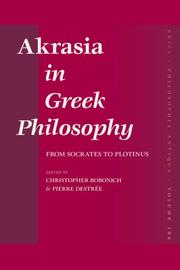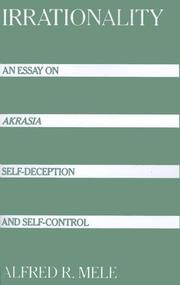| Listing 1 - 7 of 7 |
Sort by
|

ISSN: 00791687 ISBN: 9004156704 9789004156708 9786612396960 128239696X 9047420128 9789047420125 Year: 2007 Volume: 106 Publisher: Leiden Brill
Abstract | Keywords | Export | Availability | Bookmark
 Loading...
Loading...Choose an application
- Reference Manager
- EndNote
- RefWorks (Direct export to RefWorks)
Discussions on akrasia (lack of control, or weakness of will) in Greek philosophy have been particularily vivid and intense for the past two decades. Standard stories that presented Socrates as the philosopher who simply denied the phenomenon, and Plato and Aristotle as rehabilitating it straightforwardly against Socrates, have been challenged in many different ways. Building on those challenges, this collective provides new, and in some cases opposed ways of reading well-known as well as more neglected texts. Its 13 contributions, written by experts in the field, cover the whole history of Greek ethics, from Socrates to Plotinus, through Plato, Aristotle, and the Stoics (Cleanthes, Chrysippus, Epictetus).
Akrasia --- Philosophy, Ancient. --- History. --- Akrasia. --- Ethics --- Wilszwakte. --- History --- Ethics, Ancient. --- Morale ancienne --- Histoire --- Philosophy, Ancient --- Ancient philosophy --- Greek philosophy --- Philosophy, Greek --- Philosophy, Roman --- Roman philosophy --- Ethics, Greek --- Acrasia (Ethics) --- Incontinence (Ethics) --- Akrasia - Greece - History.
Book
ISBN: 946166026X 9789461660268 9058677524 9789058677525 9789058677525 Year: 2009 Publisher: Leuven, Belgium Leuven University Press
Abstract | Keywords | Export | Availability | Bookmark
 Loading...
Loading...Choose an application
- Reference Manager
- EndNote
- RefWorks (Direct export to RefWorks)
'Weakness of the will' is often used as a shorthand expression to describe a situation in which a person acts against his/her better judgement. This well-known phenomenon poses a serious philosophical problem because it questions deeply our self-understanding as rational agents. This volume offers the first comprehensive investigation into the roots of the present discussion of this subject. Four principal areas constitute the basic framework of the history of this problem: (1) the debate on akrasia in classical Greece; (2) the Christian understanding of weakness of will in late Antiquity; (3)
Will. --- Ethics, Ancient. --- Ethics, Medieval. --- Akrasia --- History --- Will --- Ethics, Ancient --- Ethics, Medieval --- Philosophy, Medieval. --- Philosophy --- History.

ISBN: 9401203423 1429456515 9781429456517 9042020784 9789042020788 9789401203425 9042020784 9789042020788 Year: 2006 Publisher: Amsterdam Rodopi
Abstract | Keywords | Export | Availability | Bookmark
 Loading...
Loading...Choose an application
- Reference Manager
- EndNote
- RefWorks (Direct export to RefWorks)
This book considers the common human predicament that we often choose an action other than the one we perceive to be best. Philosophers know this problem as akrasia. The author develops a nuanced understanding of the nature and causes of akrasia by integrating the best insights of Socrates, Aristotle, Augustine, and Aquinas, and several contemporary philosophers.
Akrasia. --- Self-control. --- Will. --- Cetanā --- Conation --- Volition --- Ethics --- Philosophy --- Psychology --- Self --- Self-discipline --- Self-mastery --- Control (Psychology) --- Discipline --- Acrasia (Ethics) --- Incontinence (Ethics) --- Will --- Self-control --- Akrasia --- Volonté --- Maîtrise de soi --- Acrasie --- Deontology --- Ethics, Primitive --- Ethology --- Moral philosophy --- Morality --- Morals --- Philosophy, Moral --- Science, Moral --- Values --- Ethics.

ISBN: 0195359879 1423735609 9781423735601 1280526602 9781280526602 9780195080018 0195080017 0197730647 Year: 1992 Publisher: New York Oxford University Press
Abstract | Keywords | Export | Availability | Bookmark
 Loading...
Loading...Choose an application
- Reference Manager
- EndNote
- RefWorks (Direct export to RefWorks)
The author demonstrates that certain forms of irrationality - incontinent action and self-deception - which many philosophers have rejected as being logically or psychologically impossible, are indeed possible.
Irrationalism (Philosophy) --- Act (Philosophy) --- Akrasia. --- Self-deception. --- Deception --- Defense mechanisms (Psychology) --- Self-perception --- Acrasia (Ethics) --- Incontinence (Ethics) --- Ethics --- Action (Philosophy) --- Agent (Philosophy) --- Philosophy --- Absurd (Philosophy) --- Belief and doubt --- Rationalism
Book
ISBN: 1315708655 1317483502 1317483529 1317483510 1138898295 9781138898295 9780367573379 9781315708652 9781317483502 Year: 2018 Publisher: New York Routledge, Taylor & Francis Group
Abstract | Keywords | Export | Availability | Bookmark
 Loading...
Loading...Choose an application
- Reference Manager
- EndNote
- RefWorks (Direct export to RefWorks)
"The Routledge Handbook of Neuroethics offers the reader an informed view of how the brain sciences are being used to approach, understand, and reinvigorate traditional philosophical questions, as well as how those questions, with the grounding influence of neuroscience, are being revisited beyond clinical and research domains. It also examines how contemporary neuroscience research might ultimately impact our understanding of relationships, flourishing, and human nature. Written by 61 key scholars and fresh voices, the Handbook's easy-to-follow chapters appear here for the first time in print and represent the wide range of viewpoints in neuroethics. The volume spotlights new technologies and historical articulations of key problems, issues, and concepts and includes cross-referencing between chapters to highlight the complex interactions of concepts and ideas within neuroethics. These features enhance the Handbook's utility by providing readers with a contextual map for different approaches to issues and a guide to further avenues of interest."--Provided by publisher.
Brain --- Cognitive neuroscience --- Research --- Moral and ethical aspects. --- Cerebrum --- Mind --- Central nervous system --- Head --- Cognitive neuropsychology --- Cognitive science --- Neuropsychology --- Neurosciences --- ethics. --- Moral and ethical aspects --- Cognitive psychology --- Professional ethics. Deontology --- neuroethiek --- neuroéthique --- Brain - Research - Moral and ethical aspects --- Cognitive neuroscience - Moral and ethical aspects --- motives --- moral improvement --- behaviour --- character --- individuals --- Akrasia --- Augmentative --- Empathy --- Ethics --- Morality --- Mos maiorum --- Neuroenhancement --- Neurotechnology --- Psilocybin
Book
ISBN: 9781400883707 1400883709 0691172900 9780691172903 9780691180816 0691180814 Year: 2018 Publisher: Princeton Princeton University Press
Abstract | Keywords | Export | Availability | Bookmark
 Loading...
Loading...Choose an application
- Reference Manager
- EndNote
- RefWorks (Direct export to RefWorks)
Marx's Inferno reconstructs the major arguments of Karl Marx's Capital and inaugurates a completely new reading of a seminal classic. Rather than simply a critique of classical political economy, William Roberts argues that Capital was primarily a careful engagement with the motives and aims of the workers' movement. Understood in this light, Capital emerges as a profound work of political theory. Placing Marx against the background of nineteenth-century socialism, Roberts shows how Capital was ingeniously modeled on Dante's Inferno, and how Marx, playing the role of Virgil for the proletariat, introduced partisans of workers' emancipation to the secret depths of the modern "social Hell." In this manner, Marx revised republican ideas of freedom in response to the rise of capitalism.Combining research on Marx's interlocutors, textual scholarship, and forays into recent debates, Roberts traces the continuities linking Marx's theory of capitalism to the tradition of republican political thought. He immerses the reader in socialist debates about the nature of commerce, the experience of labor, the power of bosses and managers, and the possibilities of political organization. Roberts rescues those debates from the past, and shows how they speak to ever-renewed concerns about political life in today's world.
Capitalism --- Political aspects. --- Dante Alighieri, --- Marx, Karl, --- Capital. --- Charles Fourier. --- Dante. --- G. A. Cohen. --- Inferno. --- Karl Marx. --- Owenism. --- Pierre-Joseph Proudhon. --- Robert Owen. --- Saint-Simonians. --- akrasia. --- anarchy. --- association. --- capital accumulation. --- capitalism. --- capitalist exploitation. --- capitalist mode of production. --- collective force. --- commerce. --- domination. --- expropriation. --- force. --- fraud. --- labor power. --- labor. --- market society. --- money. --- overwork. --- political economy. --- political theory. --- primitive accumulation. --- republicanism. --- separatism. --- social Hell. --- socialism. --- surplus labor. --- treachery. --- wages. --- workers' movement. --- working class.
Book
ISBN: 1400835550 1299051103 9781400835553 9780691131238 0691131236 Year: 2009 Publisher: Princeton, NJ Princeton University Press
Abstract | Keywords | Export | Availability | Bookmark
 Loading...
Loading...Choose an application
- Reference Manager
- EndNote
- RefWorks (Direct export to RefWorks)
This is a collection of the late Heda Segvic's papers in ancient moral philosophy. At the time of her death at age forty-five in 2003, Segvic had already established herself as an important figure in ancient philosophy, making bold new arguments about the nature of Socratic intellectualism and the intellectual influences that shaped Aristotle's ideas. Segvic had been working for some time on a monograph on practical knowledge that would interpret Aristotle's ethical theory as a response to Protagoras. The essays collected here are those on which her reputation rests, including some that were intended to form the backbone of her projected monograph. The papers range from a literary study of Homer's influence on Plato's Protagoras to analytic studies of Aristotle's metaphysics and his ideas about deliberation. Most of the papers reflect directly or indirectly Segvic's idea that both Socrates' and Aristotle's universalism and objectivism in ethics could be traced back to their opposition to Protagorean relativism. The book represents the considerable achievements of one of the most talented scholars of ancient philosophy of her generation.
Ethics --- History. --- Action theory (philosophy). --- Agency (philosophy). --- Akrasia. --- Alcibiades. --- Allusion. --- Ambiguity. --- Analogy. --- Ancient philosophy. --- Apology (Plato). --- Aporia. --- Aristotelian ethics. --- Aristotelianism. --- Aristotle. --- Calculation. --- Callicles. --- Cambridge University Press. --- Causality. --- Chaerephon. --- Charmides (dialogue). --- Charmides. --- Concept. --- Contradiction. --- Critias (dialogue). --- Critias. --- David Wiggins. --- Determination. --- Dianoia. --- Discernment. --- Disposition. --- Ethics. --- Eudaimonia. --- Eudemian Ethics. --- Existence. --- Explanation. --- George Grote. --- Good and evil. --- Gorgias. --- Greek mythology. --- Hedonism. --- Hexis. --- Hippias. --- Homer. --- Human Action. --- Hypothesis. --- Inference. --- Inquiry. --- Intellectualism. --- Kantian ethics. --- Logos. --- Metaphor. --- Moral relativism. --- Morality. --- Nicomachean Ethics. --- Objectivity (philosophy). --- Pericles. --- Phaedo. --- Philosopher. --- Philosophical analysis. --- Philosophy. --- Phronesis. --- Plato. --- Platonic Academy. --- Platonic realism. --- Polus. --- Potentiality and actuality. --- Practical reason. --- Prodicus. --- Prohairesis. --- Protagoras. --- Rationalism. --- Rationality. --- Reason. --- Relativism. --- Republic (Plato). --- Rhetoric. --- Self-actualization. --- Socratic dialogue. --- Socratic method. --- Socratic. --- Sophism. --- Sophist (dialogue). --- Sophist. --- Subjectivity. --- Suggestion. --- Terence Irwin. --- The Death of Socrates. --- Theaetetus (dialogue). --- Theory of Forms. --- Theory. --- Thought. --- Thucydides. --- Treatise. --- Understanding. --- Value (ethics). --- Value judgment. --- Virtue. --- Voluntariness. --- Voluntary action. --- W. D. Ross. --- Writing.
| Listing 1 - 7 of 7 |
Sort by
|

 Search
Search Feedback
Feedback About UniCat
About UniCat  Help
Help News
News